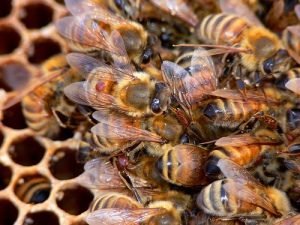Whose Fault Is It?
Mea Culpa. Mea Culpa. I have sadly neglected my poor little blog. Honestly, I’ve had good reasons and they are called organic chemistry and sensory physiology. I have studied like a fiend to pass those classes with success in only one (one day chemistry will make sense to me and with hard work I will be able to understand it enough to regurgitate it for a test).
That said, I had an experience early in the term over much I have mulled and percolated. It happened the second week on term in my discussion section for sensory phys.
I was sitting in a group different from my normal one. The group included a much older gentleman from our class who seemed really fascinated by neuroscience. The guy was so knowledgeable that he could have taught the discussion section.
I really liked him because he’s a non-traditional student like me. We talked about our interest in science and I revealed that I was a PR and biology double major. We talked about the communication breakdown betweeen science and media and then he said something very striking.
“I wonder whose fault it is?”
For weeks, I have been thinking about this idea of fault. Ultimately, I think that we all get a slice of blame pie. But is fault a useful idea? I’m not sure. To me fault is legal concept. To discover fault we must look always in the past. Discovery of fault allows us to abdicate our own responsiblity.
If we are busy trying to assign fault, can we begin to move forward.
Moving forward should be the goal of all communication professionals. Creating relationships, bring scientists back into the larger community, encouraging the public to excercise native curiosity, all of these things should be a priority for science communicators.
How do we get from point A to B?
I have a suggestion. When my husband and I fight we both apologize. It usually goes something like this:
Him: I’m sorry that I lost my temper and yelled, but I was really upset.
Me: I’m sorry too. I should have known better than to use your toothbrush to clean the tub grout. I am sorry I was so thoughtless.
So, scientists, media people, and the public should apologize to each other.
Scientist: I am sorry that I have forgotten what it’s like not to know.
Media person: I am sorry I didn’t ask more questions.
Average Person: I am sorry I didn’t pursue curiosity.
Now, can we move forward.
How to Green the Economy
I have spent the last 10 weeks working with my campaigns (J454) group researching and writing a PR plan for Arcimoto, LLC an electric vehicle (EV) manufacturer in Eugene, Oregon. The assignment was to develop a plan and implementation pieces that would support tax-credit legislation for EV purchase in the state of Oregon.
So, despite some internal tumult and lack of information from Arcimoto (feels just like the real world), our group developed the best plan that we could.
Imagine my chagrin when the morning that we turned in our project for a grade I happened to catch one of my favorite editorialist, Thomas Friedman of The New York Times, on CNN talking about greening the economy.
Friedman stated that the purchase of hybrid vehicles in the commonwealth of Virginia actually increased with increasing gas prices and decreased when people paid less at the pump.
In his column that week he said that we could encourage green innovation, control oil rich despots, and fight the war on terror by increasing the tax on gas.
Is it possible that instead of advocating for tax-credits, Arcimoto should have suggested a gas tax increase?
How does one go about arguing for taxes?
To my knowledge, legislators write tax legislation to cover the cost of a program. That would then mean that a program would have to be developed to justify and utilize the collected taxes.
Is there a way that we can use gas tax revenue to fund alternative fuel and alternative fuel vehicles?
Would it be okay for a company like Arcimoto to be involved with such an endeavor?
I’m not sure. To me it smacks of cynicism. But then again it would not be the first time I’ve been grossed out by political realities both in real life and while working on this particular project.
Photo courtesty of mlhradio photostream at flickr.com.
E-mail is Forever … Beware
The University of East Anglia’s PR department is probably scrambling this week setting up sensitivity training and putting out e-mails about the proper use of e-mail after The New York Times printed an article about some hacked emails in which some climatology scientist wrote some rather inflammatory statements, including calling their climate change opponents “idiots” and using statistical “tricks.”
Sometimes, it is hard to be a scientist.
The root of it seems to be an “us versus them” attitude in the science community. Scientists are the great receivers of knowledge and everyone else … well, don’t worry your pretty little heads, the scientist will tell you what’s going on.
These top-down communication models, even in the best circumstances, seem abusive.
It’s no wonder that scientists can’t get any traction on some major issues.
According to the Pew Research Center 32 percent of Americans polled accepted the idea of evolution, and 49 percent believed in global warming. Most scientists agree that there is a large knowledge gap.
Scientists should definitely look into a re-branding campaign.
Scientists like Albert Einstein, Louis Pasteur and Marie Curie are like rock legends, but we need some more new stars who want to share with the public their work and their passion.
Will this ever happen? Will scientists willfully choose to descend from Olympus? I hope so.
Meanwhile, I bet there’s an IT person who read this NYT article and thought “idiots.”
Picture of Lokey Laboratory courtesy of Wolfram Burner at Flickr.com.
What Should We Do About the Honeybees?

I mean it — why should we care?
I have always been interested in honeybees and their wasp brethren since childhood, probably because my father was a beekeeper and amateur entomologist. So a couple of years ago when Haagen Daz put out a commercial about hive failure in bees, I took notice.
Since that time there have been a number of stories about hive failure in the local newspaper, Mother Earth News, Martha Stewart Living, a documentary titled “The Last Beekeeper,” and web videos of farmers in China pollinating crops by hand because of hive collapse.
Scientists still do not understand the cause of these collapses, although they suspect pesticides and the stressful conditions that the bees endure in long-distance transportation. Here in the Pacific Northwest, the Oregon State University entomology department landed a government grant to study the phenomenon.
The loss of honeybees might deplete society’s food supply and result in a loss of man hours if Americans have to pollinate flowers by hand.
I don’t know what we, the public, should do about it. Should we all plant purple flowering plants in our yards; should we legislate against the use of pesticides; should we buy local honey; should we start home apiaries; or should we tackle and put in a headlock anyone we see harming a bee? I’m not sure.
Public relations teachers tell students to ask “to what effect” when writing a plan. Sometimes the effect looked for is an increase in awareness among the public. What good is increased awareness?
That’s a lot of questions, but as a public relations student it’s my job to ask questions. I read recently that most media serves to inform not educate. As we use more social media — which is less objective, more built upon relationships, and perceived as trustworthy — these types of amorphous objectives will change.
Let me suggest that we begin to ask ourselves what we specifically want people to do with their newly found knowledge.
How can people help the honeybees?
Photograph: courtesy of bugman50@flickr.com
DHS Brings Relief For H1N1 Worry
H1N1. Every day I hear worrying news about H1N1. The president declared a “national emergency.” Pharmaceutical companies cannot produce enough vaccine. Nightly news shows highlight people on death’s door with influenza. Even my doctor told me that although he will get the vaccine for himself and his kids when it is available, he believes we will have all contracted the virus by then … great.
With this kind of news at the beginning of flu and cold season it’s hard not to freak out.
And then I received a pamphlet from the Oregon Department of Human Services, and the worry decreased to a dull roar.
I give this communication tool an A plus. The tri-fold pamphlet printed in a soothing gray provides not only information on symptoms and states that for most people the best medicine is “rest and nutrition,” but also gives a list of symptoms for adults and children that would require a visit to the office. I really appreciate the latter because in particular, I want to know what is too sick. It also talks about the risks associated with both H1N1 and regular influenza. The writers even repeat some of the more vital information throughout the text.
I posted the symptom checklist on my refrigerator to be posted for the duration of cold and flu season. For more information please check the DHS site http://flu.oregon.gov. or other healthcare sites www.flu.gov and www.who.int.
First Trip to the Blogosphere
I fell in love with science.
Literally, I fell into a tide pool at the Oregon Coast on a trip for a field biology class. My classmates and I were standing on rocks covered in slick green seaweed. The hard, heavy rain blew straight into our faces. I was in a small group trying to classify a crab.With the crab key disintegrating in one hand and Mr. Escape Crab in the other, I lost my balance and fell into the pool. My favorite blue pea-coat ruined, my rear end scraped by a rock, everything I brought down to the rocks wet from the sea or rain, and I thought: This is the best trip ever. I changed my major to biology and public relations.
Since then I have been passionate about science in media. How are scientific ideas represented? How and how effectively is the information translated? What are the obvious messages and what are the hidden messages? I have found that often media are not clear about science. The sciences might seem daunting to some writers and public communication might be a nightmare to some scientists, but I believe that there are good ways to communicate useful information to the public. That is what I will explore in my blog.
So here I am with my blue pea-coat on, and I am ready to fall again.

